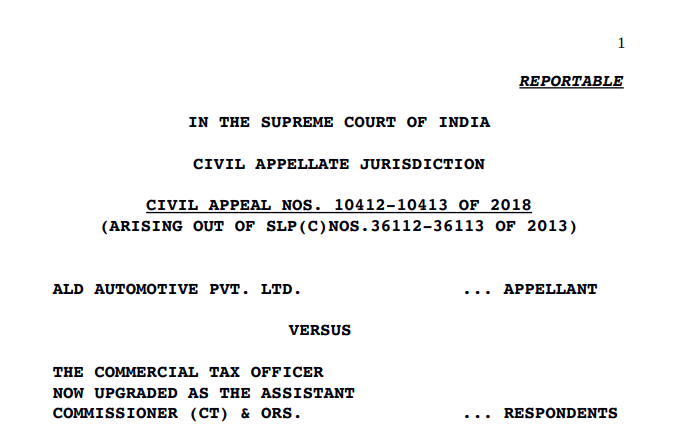SC in the case of ALD Automotive Pvt. Ltd. Vs Commercial Tax Officer
Table of Contents
Case Covered:
ALD Automotive Pvt. Ltd.
Versus
The Commercial Tax Officer
Facts of the case:
In this case a provision of Tamil Nadu VAT was challenged. It curtailed the input tax credit and put a condition on it. Section 19 having 20 sub sections. It placed various conditions on eligibility of ITC. The issue raised in this case was for sub sec 11 of section 19 of TNVAT which reads as under.
“19(11) In case any registered dealer fails to claim input tax credit in respect of any transaction of taxable purchase in any month, he shall make the claim before the end of the financial year or before ninety days from the date of purchase, whichever is later.”
The court considered various judgements related to the interpretation of fiscal statutes. The court considered the judgment of same court in case of RK Garg, In which it was held that
“Another rule of equal importance is that laws relating to economic activities should be viewed with greater latitude than laws touching civil rights such as freedom of speech, religion etc. It has been said by no less a person than Holmes, J., that the legislature should be allowed some play in the joints, because it has to deal with complex problems which do not admit of solution through any doctrinaire or straitjacket formula and this is particularly true in case of legislation dealing with economic matters, where, having regard to the nature of the problems required to be dealt with, greater play in the joints has to be allowed to the legislature.”
Provision in the statute is not to be read in isolation rather it has to read along with other related provisions-
In this regard the judgement of Kailash Chandra and another versus Mukundi lal and others, 2002 (2) SCC 678. Was considered by the honorable court.
“A provision in the statute is not to be read in isolation. It has to be read with other related provisions in the Act itself, 19 more particularly, when the subject matter dealt with in different sections or parts of the same statute is the same or similar in nature.”
The court observed that section 3 is the levy section which creates the levy. Section 19(11) contains a condition for claiming the input tax credit. The submission that Section 19 is inconsistent to Section 3(3) is wholly misconceived.
The judgment of AIR (1967) SC 1823, Sales Tax officer, Ponkunnam and another versus K.I. Abraham was considered. There was no power under the section to prescribe a time limit but it was prescribed and the court rightly dropped the provision putting a time limit. But the same is not the case with current provision. Here the provision is given in the Act itself.
Another case considered was Commissioner of Central Excise, Madras versus Home Ashok Leyland Ltd., 2007.
The High Court had held that Rule 57E as amended was clarificatory in nature and shall not affect the right of manufacturer to claim MODVAT credit for duty paid on inputs.
Even this case is not directly related to the current case. Many of the other judgements were discussed.
Observations & Judgement of the court:
The taxing statute has to be strictly construed. Nothing is to be read in, nothing is to be implied and language used in taxing statute had to be looked into fairly. The benefits envisaged in the taxing statute had to be extended as per the restrictions and conditions envisaged therein.
The following issues raised in this judgment were answered accordingly.
(1) Whether Section 19(11) violates Article 14 and 19(1)(g) of the Constitution of India ?
No
(2) Whether Section 19(11) is inconsistent with Section 3(3) of the Act ?
No
(3) Whether Section 19(11) is directory provision, noncompliance of which cannot be a ground for denial of input tax credit to the appellants ?
No, It is a Mandatory provision.
(4) Whether denial of input tax credit to the appellants is contrary to the scheme of VAT Act, 2006 ?
No
(5) Whether Assessing Authorities could have extended the period for claiming Input Tax Credit
No
Download the copy:
 CA Shafaly Girdharwal
CA Shafaly Girdharwal
CA
New Delhi, India
CA Shaifaly Girdharwal is a GST consultant, Author, Trainer and a famous You tuber. She has taken many seminars on various topics of GST. She is Partner at Ashu Dalmia & Associates and heading the Indirect Tax department. She has authored a book on GST published by Taxmann.








